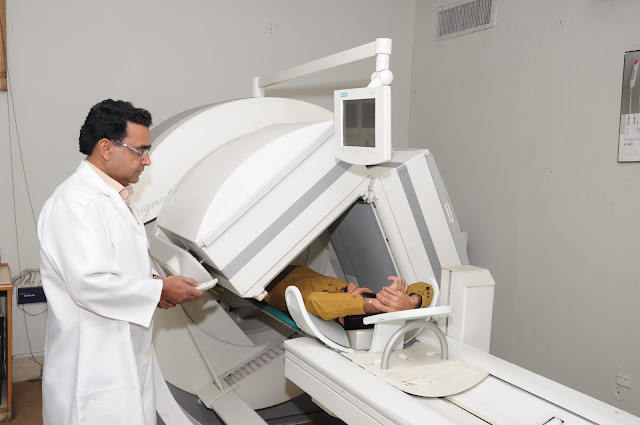Thallium stress test is a test which measures the blood flow into the heart, while your body is at rest and when your body is engaged in any physical activity. Thallium stress test is also known as a cardiac test or nuclear stress test. The thallium stress test shows the size of heart chambers if any heart muscle is damaged or defected due to a heart attack in the past. The thallium stress test also shows if a heart is pumping blood properly and checks whether all the coronary arteries are supplying blood to the heart. The test measures the ability of your body to take the stress.
Thallium stress test is done:
Thallium stress test is done:
- If a person have chest pain
- If a person have worsening angina
- To check the blood flow into the heart
- To measure the results of the surgery
- To check the effectiveness of medicines
- If a person had a heart attack
- To guide the treatment of heart disease
Thallium stress test Procedure
The thallium test is carried out at a hospital, diagnostic centre, or at an outpatient clinic. During the thallium test procedure a nuclear liquid known as radioisotope is inserted through an intravenous sedation. Sometimes, instead of radioisotope, a doctor may use a radiopharmaceutical medication such as thallium or sestamibi. The nuclear liquid inserted into a patient, flows through a bloodstream and reaches the patient’s heart. After that, a camera like device known as gamma camera is used to measure the outcomes of the test. The gamma camera identifies the radiation and display the problems associated with the patient’s heart. The test is done in two parts-first a patient is asked to lie down and relax for 15-20 minutes and in the second part, the patient is asked to run on a treadmill or pedal an exercise bicycle for half an hour.
Risks of a Thallium stress test
The Thallium stress test is usually safe and there are rare chances of any complications. The risks associated with a thallium stress test are same as with other medical procedure. Some risks related with thallium stress test are listed below.
- Myocardial infarction
- Irregular heart beats
- Difficulty in breathing
- Skin irritation
- Dizziness
- Allergic reaction
- Frequent changes in blood pressure
- Pain in the chest
Thallium stress test results
The results of thallium stress test depend on the patient’s age, medical history, and other health issues. The normal result indicates the healthy flow of blood to the heart through the coronary arteries. The abnormal result shows the poor flow of blood to the heart due to a blockage or narrowing down of an artery that supplies blood to the heart. The abnormal thallium stress test results also reveal the coronary artery disease or other heart complications.


